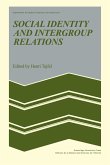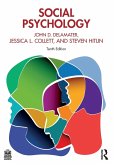Intergroup Relations
Herausgeber: Crisp, Richard J.
Intergroup Relations
Herausgeber: Crisp, Richard J.
- Broschiertes Buch
- Merkliste
- Auf die Merkliste
- Bewerten Bewerten
- Teilen
- Produkt teilen
- Produkterinnerung
- Produkterinnerung
This new, four-volume Major Work presents a comprehensive and authoritative collection of both classic and contemporary readings in intergroup relations. Each volume is opened by an introductory chapter which provides the reader with an overview of the primary topics covered therein, and the rationale behind the editor's selection.
Andere Kunden interessierten sich auch für
![Social Identity and Intergroup Relations Social Identity and Intergroup Relations]() Social Identity and Intergroup Relations49,99 €
Social Identity and Intergroup Relations49,99 €![The Neuroscience of Intergroup Relations The Neuroscience of Intergroup Relations]() The Neuroscience of Intergroup Relations123,99 €
The Neuroscience of Intergroup Relations123,99 €![Examining Complex Intergroup Relations Examining Complex Intergroup Relations]() Examining Complex Intergroup Relations42,99 €
Examining Complex Intergroup Relations42,99 €![Using Intergroup Contact to Fight Prejudice and Negative Attitudes Using Intergroup Contact to Fight Prejudice and Negative Attitudes]() Loris VezzaliUsing Intergroup Contact to Fight Prejudice and Negative Attitudes35,99 €
Loris VezzaliUsing Intergroup Contact to Fight Prejudice and Negative Attitudes35,99 €![Social Psychology Social Psychology]() John D. DeLamaterSocial Psychology67,99 €
John D. DeLamaterSocial Psychology67,99 €![Social Psychology Social Psychology]() John D. DeLamaterSocial Psychology124,99 €
John D. DeLamaterSocial Psychology124,99 €![Pragmatics, (im)politeness, and intergroup communication Pragmatics, (im)politeness, and intergroup communication]() Pilar G. Blitvich (Charlotte University of North Carolina)Pragmatics, (im)politeness, and intergroup communication25,99 €
Pilar G. Blitvich (Charlotte University of North Carolina)Pragmatics, (im)politeness, and intergroup communication25,99 €-
-
-
This new, four-volume Major Work presents a comprehensive and authoritative collection of both classic and contemporary readings in intergroup relations. Each volume is opened by an introductory chapter which provides the reader with an overview of the primary topics covered therein, and the rationale behind the editor's selection.
Hinweis: Dieser Artikel kann nur an eine deutsche Lieferadresse ausgeliefert werden.
Hinweis: Dieser Artikel kann nur an eine deutsche Lieferadresse ausgeliefert werden.
Produktdetails
- Produktdetails
- SAGE Library in Social Psychology
- Verlag: SAGE Publications Ltd
- Seitenzahl: 1400
- Erscheinungstermin: 22. April 2014
- Englisch
- Abmessung: 166mm x 245mm x 97mm
- Gewicht: 2690g
- ISBN-13: 9781446274033
- ISBN-10: 1446274039
- Artikelnr.: 40154419
- Herstellerkennzeichnung
- Libri GmbH
- Europaallee 1
- 36244 Bad Hersfeld
- gpsr@libri.de
- SAGE Library in Social Psychology
- Verlag: SAGE Publications Ltd
- Seitenzahl: 1400
- Erscheinungstermin: 22. April 2014
- Englisch
- Abmessung: 166mm x 245mm x 97mm
- Gewicht: 2690g
- ISBN-13: 9781446274033
- ISBN-10: 1446274039
- Artikelnr.: 40154419
- Herstellerkennzeichnung
- Libri GmbH
- Europaallee 1
- 36244 Bad Hersfeld
- gpsr@libri.de
Volume 1 - Cognitive Processes
Implicit Intergroup Bias
Attitudes established by classical conditioning - Arthur Staats & Carolyn
Staats
Us and them: social categorization and the process of intergroup bias -
Charles Perdue, John Dovidio, Michael Gurtman & Richard Tyler
Measuring individual differences in implicit cognition: The implicit
association test - Anthony Greenwald, Debbie McGhee & Jordan Schwartz
Discrimination and the implicit association test - Laurie Rudman & Richard
Ashmore
Language use in intergroup contexts: The linguistic intergroup bias - Anne
Maass et al.
Stereotyping and Intergroup Relations
Perceived variability of personal characteristics in ingroups and
outgroups: The role of knowledge and evaluation - Edward Jones, George Wood
& George Quattrone
Perceptions of out-group homogeneity and levels of social categorization:
Memory for the subordinate attributes of in-group and out-group members -
Bernadette Park & Myron Rothbart
Perceived intragroup homogeneity in minority-majority contexts - Bernd
Simon & Rupert Brown
Mere categorization
Social categorization and intergroup behaviour - Henri Tajfel et al.
Categorical and contextual bases of person memory and stereotyping -
Shelley Taylor et al.
Ingroup bias and the minimal group paradigm: A cognitive-motivational
analysis - Marilynn Brewer
Depersonalization and Projection
Self and collective: Cognition and social context - John Turner et al.
Social projection to ingroups and outgroups: A review and meta-analysis -
Jordan Robbins & Joachim Krueger
The ingroup as pars pro toto: Projection from the ingroup onto the
inclusive category as a precursor to social discrimination - Michael
Wenzel, Amelie Mummendey, Ulrike Weber & Sven Waldzus
Multiple Categorization
Differential evaluation of crossed category groups: Patterns, processes,
and reducing intergroup bias - Richard Crisp & Miles Hewstone
Volume 2 - Motivations and Ideology
Self-esteem
Social identity theory¿s self-esteem hypothesis: A review and some
suggestions for clarification - Mark Rubin & Miles Hewstone
Distinctiveness
The social self: On being the same and different at the same time -
Marilynn Brewer
Self-stereotyping in the face of threats to group status and
distinctiveness: The role of group identification - Russell Spears, Bertjan
Doosje & Naomi Ellemers
Reducing intergroup bias: The moderating role of ingroup identification -
Richard Crisp & Sarah Beck
Subjective Group Dynamics
Anti-norm and pro-norm deviance in the bank and on the campus: Two
experiments on subjective group dynamics - Dominic Abrams et al.
Uncertainty
Subjective uncertainty and intergroup discrimination in the minimal group
situation - Paul Grieve & Michael Hogg
Existential Threat
Evidence for terror management theory II: The effects of mortality salience
on reactions to those who threaten or bolster the cultural worldview - Jeff
Greenberg et al.
I belong therefore I exist: Ingroup identification, ingroup entitativity,
and ingroup bias - Emanuele Castano et al.
Ideology
Social dominance orientation and intergroup bias: The legitimation of
favoritism for high-status groups - Shana Levin et al.
Antecedents and consequences of system-justifying ideologies. - John Jost &
Orsoly Hunyady
Inequality, Discrimination, and the Power of the Status Quo: Direct
Evidence for a Motivation to See the Way Things Are as the Way They Should
Be - Aaron Kay et al.
Multiculturalism
Framing interethnic ideology: Effects of multicultural and colorblind
perspectives on judgments of groups and individuals - Christopher Wolsko,
Bernadette Park, Charles Judd & Bernd Wittenbrink
Multicultural and colorblind ideology, stereotypes, and ethno-centrism
among Black and White Americans - Carey Ryan et al.
Multiple Identities
Social identity complexity and outgroup tolerance. - Marilynn Brewer &
Kathleen Pierce
Volume 3 - Emotion, Biology and Evolution
Intergroup Emotions
Antecedents and consequences of satisfaction and guilt following ingroup
aggression - Angela Maitner, Diane Mackie & Eliot Smith
Seeing red or feeling blue: Differentiated intergroup emotions and ingroup
identification in soccer fans - Richard Crisp et al.
Infrahumanization
Differential association of uniquely and non uniquely human emotions with
the ingroup and the outgroup - Maria-Paola Paladino et al.
Aid in the aftermath of Hurricane Katrina: Inferences of secondary emotions
and intergroup helping - Amy Cuddy, Mindi Rock and Michael
The Impact of Intergroup Emotions on Forgiveness in Northern Ireland -
Tania Tam et al.
Neuroscience
Performance on indirect measures of race evaluation predicts amygdala
activity - Elizabeth Phelps et al.
Dehumanizing the lowest of the low: Neuroimaging responses to extreme
out-groups - Lasana Harris & Susan Fiske
Evolution
Can race be erased? Coalitional computation and social categorization -
Robert Kurzban, John Tooby & Leda Cosmides
Gender differences in competition and cooperation: The male warrior
hypothesis - Mark Van Vugt, David De Cremer, & Dirk Janssen
Fear extinction to an out-group face: The role of target gender - Carlos
David Navarrete et al.
Evolved disease-avoidance mechanisms and contemporary xenophobic attitudes
- Jason Faulkner et al.
Interpersonal disgust, ideological orientations, and dehumanization as
predictors of intergroup attitudes - Gordon Hodson & Kimberly Costello
Anxiety and Intergroup Bias: Terror Management or Coalitional Psychology? -
C. David Navarrete et al.
Volume 4 - Improving Intergroup Relations
Contact
Generalized intergroup contact effects on prejudice - Thomas Pettigrew
Dimensions of Contact as Predictors of Intergroup Anxiety, Perceived
Out-Group Variability, and Out-Group Attitude: An Integrative Model - Mir
Rabiul Islam & Miles Hewstone
Do ideologically intolerant people benefit from intergroup contact? -
Gordon Hodson
The contact caveat: Negative contact predicts increased prejudice more than
positive contact predicts reduced prejudice - Fiona Kate Barlow et al.
The effects of ingroup and outgroup friendships on ethnic attitudes in
college: A longitudinal study - Shana Levin, Colette van Laar & Jim
Sidanius
Extended Contact
Effects of direct and indirect cross-group friendships on judgments of
catholics and protestants in Northern Ireland: The mediating role of an
anxiety-reduction mechanism - Stefania Paolini et al.
Recategorization
Reducing intergroup bias: The benefits of recategorization - Samuel
Gaertner et al.
Changing interracial evaluations and behavior: The benefits of a common
ingroup identity - Jason Nier et al.
"Gringos" in Mexico: Cross-sectional and longitudinal effects of language
school-promoted contact on intergroup bias - Anja Eller & Dominic Abrams
Subgroup relations: A comparison of mutual intergroup differentiation and
common ingroup identity models of prejudice reduction - Matthew Hornsey &
Michael Hogg
Recategorization and subgroup identification: Predicting and preventing
threats from common ingroups - Richard Crisp, Catriona Stone & Natalie Hall
Superordinate identification, subgroup identification, and justice
concerns: Is separatism the problem? Is assimilation the answer? - Yuen Huo
et al.
Cognitive Interventions
The effects of perspective-taking on prejudice: The moderating role of
self-evaluation - Adam Galinsky & Gillian Ku
Imagining intergroup contact can improve intergroup attitudes - Rhiannon
Turner, Richard Crisp & Emily Lambert
Improving explicit and implicit intergroup attitudes using imagined
contact: An experimental intervention with elementary school children -
Loris Vezzali et al.
Secondary transfer effects from imagined contact: Group similarity affects
the generalization gradient - Jake Harwood et al.
Implicit Intergroup Bias
Attitudes established by classical conditioning - Arthur Staats & Carolyn
Staats
Us and them: social categorization and the process of intergroup bias -
Charles Perdue, John Dovidio, Michael Gurtman & Richard Tyler
Measuring individual differences in implicit cognition: The implicit
association test - Anthony Greenwald, Debbie McGhee & Jordan Schwartz
Discrimination and the implicit association test - Laurie Rudman & Richard
Ashmore
Language use in intergroup contexts: The linguistic intergroup bias - Anne
Maass et al.
Stereotyping and Intergroup Relations
Perceived variability of personal characteristics in ingroups and
outgroups: The role of knowledge and evaluation - Edward Jones, George Wood
& George Quattrone
Perceptions of out-group homogeneity and levels of social categorization:
Memory for the subordinate attributes of in-group and out-group members -
Bernadette Park & Myron Rothbart
Perceived intragroup homogeneity in minority-majority contexts - Bernd
Simon & Rupert Brown
Mere categorization
Social categorization and intergroup behaviour - Henri Tajfel et al.
Categorical and contextual bases of person memory and stereotyping -
Shelley Taylor et al.
Ingroup bias and the minimal group paradigm: A cognitive-motivational
analysis - Marilynn Brewer
Depersonalization and Projection
Self and collective: Cognition and social context - John Turner et al.
Social projection to ingroups and outgroups: A review and meta-analysis -
Jordan Robbins & Joachim Krueger
The ingroup as pars pro toto: Projection from the ingroup onto the
inclusive category as a precursor to social discrimination - Michael
Wenzel, Amelie Mummendey, Ulrike Weber & Sven Waldzus
Multiple Categorization
Differential evaluation of crossed category groups: Patterns, processes,
and reducing intergroup bias - Richard Crisp & Miles Hewstone
Volume 2 - Motivations and Ideology
Self-esteem
Social identity theory¿s self-esteem hypothesis: A review and some
suggestions for clarification - Mark Rubin & Miles Hewstone
Distinctiveness
The social self: On being the same and different at the same time -
Marilynn Brewer
Self-stereotyping in the face of threats to group status and
distinctiveness: The role of group identification - Russell Spears, Bertjan
Doosje & Naomi Ellemers
Reducing intergroup bias: The moderating role of ingroup identification -
Richard Crisp & Sarah Beck
Subjective Group Dynamics
Anti-norm and pro-norm deviance in the bank and on the campus: Two
experiments on subjective group dynamics - Dominic Abrams et al.
Uncertainty
Subjective uncertainty and intergroup discrimination in the minimal group
situation - Paul Grieve & Michael Hogg
Existential Threat
Evidence for terror management theory II: The effects of mortality salience
on reactions to those who threaten or bolster the cultural worldview - Jeff
Greenberg et al.
I belong therefore I exist: Ingroup identification, ingroup entitativity,
and ingroup bias - Emanuele Castano et al.
Ideology
Social dominance orientation and intergroup bias: The legitimation of
favoritism for high-status groups - Shana Levin et al.
Antecedents and consequences of system-justifying ideologies. - John Jost &
Orsoly Hunyady
Inequality, Discrimination, and the Power of the Status Quo: Direct
Evidence for a Motivation to See the Way Things Are as the Way They Should
Be - Aaron Kay et al.
Multiculturalism
Framing interethnic ideology: Effects of multicultural and colorblind
perspectives on judgments of groups and individuals - Christopher Wolsko,
Bernadette Park, Charles Judd & Bernd Wittenbrink
Multicultural and colorblind ideology, stereotypes, and ethno-centrism
among Black and White Americans - Carey Ryan et al.
Multiple Identities
Social identity complexity and outgroup tolerance. - Marilynn Brewer &
Kathleen Pierce
Volume 3 - Emotion, Biology and Evolution
Intergroup Emotions
Antecedents and consequences of satisfaction and guilt following ingroup
aggression - Angela Maitner, Diane Mackie & Eliot Smith
Seeing red or feeling blue: Differentiated intergroup emotions and ingroup
identification in soccer fans - Richard Crisp et al.
Infrahumanization
Differential association of uniquely and non uniquely human emotions with
the ingroup and the outgroup - Maria-Paola Paladino et al.
Aid in the aftermath of Hurricane Katrina: Inferences of secondary emotions
and intergroup helping - Amy Cuddy, Mindi Rock and Michael
The Impact of Intergroup Emotions on Forgiveness in Northern Ireland -
Tania Tam et al.
Neuroscience
Performance on indirect measures of race evaluation predicts amygdala
activity - Elizabeth Phelps et al.
Dehumanizing the lowest of the low: Neuroimaging responses to extreme
out-groups - Lasana Harris & Susan Fiske
Evolution
Can race be erased? Coalitional computation and social categorization -
Robert Kurzban, John Tooby & Leda Cosmides
Gender differences in competition and cooperation: The male warrior
hypothesis - Mark Van Vugt, David De Cremer, & Dirk Janssen
Fear extinction to an out-group face: The role of target gender - Carlos
David Navarrete et al.
Evolved disease-avoidance mechanisms and contemporary xenophobic attitudes
- Jason Faulkner et al.
Interpersonal disgust, ideological orientations, and dehumanization as
predictors of intergroup attitudes - Gordon Hodson & Kimberly Costello
Anxiety and Intergroup Bias: Terror Management or Coalitional Psychology? -
C. David Navarrete et al.
Volume 4 - Improving Intergroup Relations
Contact
Generalized intergroup contact effects on prejudice - Thomas Pettigrew
Dimensions of Contact as Predictors of Intergroup Anxiety, Perceived
Out-Group Variability, and Out-Group Attitude: An Integrative Model - Mir
Rabiul Islam & Miles Hewstone
Do ideologically intolerant people benefit from intergroup contact? -
Gordon Hodson
The contact caveat: Negative contact predicts increased prejudice more than
positive contact predicts reduced prejudice - Fiona Kate Barlow et al.
The effects of ingroup and outgroup friendships on ethnic attitudes in
college: A longitudinal study - Shana Levin, Colette van Laar & Jim
Sidanius
Extended Contact
Effects of direct and indirect cross-group friendships on judgments of
catholics and protestants in Northern Ireland: The mediating role of an
anxiety-reduction mechanism - Stefania Paolini et al.
Recategorization
Reducing intergroup bias: The benefits of recategorization - Samuel
Gaertner et al.
Changing interracial evaluations and behavior: The benefits of a common
ingroup identity - Jason Nier et al.
"Gringos" in Mexico: Cross-sectional and longitudinal effects of language
school-promoted contact on intergroup bias - Anja Eller & Dominic Abrams
Subgroup relations: A comparison of mutual intergroup differentiation and
common ingroup identity models of prejudice reduction - Matthew Hornsey &
Michael Hogg
Recategorization and subgroup identification: Predicting and preventing
threats from common ingroups - Richard Crisp, Catriona Stone & Natalie Hall
Superordinate identification, subgroup identification, and justice
concerns: Is separatism the problem? Is assimilation the answer? - Yuen Huo
et al.
Cognitive Interventions
The effects of perspective-taking on prejudice: The moderating role of
self-evaluation - Adam Galinsky & Gillian Ku
Imagining intergroup contact can improve intergroup attitudes - Rhiannon
Turner, Richard Crisp & Emily Lambert
Improving explicit and implicit intergroup attitudes using imagined
contact: An experimental intervention with elementary school children -
Loris Vezzali et al.
Secondary transfer effects from imagined contact: Group similarity affects
the generalization gradient - Jake Harwood et al.
Volume 1 - Cognitive Processes
Implicit Intergroup Bias
Attitudes established by classical conditioning - Arthur Staats & Carolyn
Staats
Us and them: social categorization and the process of intergroup bias -
Charles Perdue, John Dovidio, Michael Gurtman & Richard Tyler
Measuring individual differences in implicit cognition: The implicit
association test - Anthony Greenwald, Debbie McGhee & Jordan Schwartz
Discrimination and the implicit association test - Laurie Rudman & Richard
Ashmore
Language use in intergroup contexts: The linguistic intergroup bias - Anne
Maass et al.
Stereotyping and Intergroup Relations
Perceived variability of personal characteristics in ingroups and
outgroups: The role of knowledge and evaluation - Edward Jones, George Wood
& George Quattrone
Perceptions of out-group homogeneity and levels of social categorization:
Memory for the subordinate attributes of in-group and out-group members -
Bernadette Park & Myron Rothbart
Perceived intragroup homogeneity in minority-majority contexts - Bernd
Simon & Rupert Brown
Mere categorization
Social categorization and intergroup behaviour - Henri Tajfel et al.
Categorical and contextual bases of person memory and stereotyping -
Shelley Taylor et al.
Ingroup bias and the minimal group paradigm: A cognitive-motivational
analysis - Marilynn Brewer
Depersonalization and Projection
Self and collective: Cognition and social context - John Turner et al.
Social projection to ingroups and outgroups: A review and meta-analysis -
Jordan Robbins & Joachim Krueger
The ingroup as pars pro toto: Projection from the ingroup onto the
inclusive category as a precursor to social discrimination - Michael
Wenzel, Amelie Mummendey, Ulrike Weber & Sven Waldzus
Multiple Categorization
Differential evaluation of crossed category groups: Patterns, processes,
and reducing intergroup bias - Richard Crisp & Miles Hewstone
Volume 2 - Motivations and Ideology
Self-esteem
Social identity theory¿s self-esteem hypothesis: A review and some
suggestions for clarification - Mark Rubin & Miles Hewstone
Distinctiveness
The social self: On being the same and different at the same time -
Marilynn Brewer
Self-stereotyping in the face of threats to group status and
distinctiveness: The role of group identification - Russell Spears, Bertjan
Doosje & Naomi Ellemers
Reducing intergroup bias: The moderating role of ingroup identification -
Richard Crisp & Sarah Beck
Subjective Group Dynamics
Anti-norm and pro-norm deviance in the bank and on the campus: Two
experiments on subjective group dynamics - Dominic Abrams et al.
Uncertainty
Subjective uncertainty and intergroup discrimination in the minimal group
situation - Paul Grieve & Michael Hogg
Existential Threat
Evidence for terror management theory II: The effects of mortality salience
on reactions to those who threaten or bolster the cultural worldview - Jeff
Greenberg et al.
I belong therefore I exist: Ingroup identification, ingroup entitativity,
and ingroup bias - Emanuele Castano et al.
Ideology
Social dominance orientation and intergroup bias: The legitimation of
favoritism for high-status groups - Shana Levin et al.
Antecedents and consequences of system-justifying ideologies. - John Jost &
Orsoly Hunyady
Inequality, Discrimination, and the Power of the Status Quo: Direct
Evidence for a Motivation to See the Way Things Are as the Way They Should
Be - Aaron Kay et al.
Multiculturalism
Framing interethnic ideology: Effects of multicultural and colorblind
perspectives on judgments of groups and individuals - Christopher Wolsko,
Bernadette Park, Charles Judd & Bernd Wittenbrink
Multicultural and colorblind ideology, stereotypes, and ethno-centrism
among Black and White Americans - Carey Ryan et al.
Multiple Identities
Social identity complexity and outgroup tolerance. - Marilynn Brewer &
Kathleen Pierce
Volume 3 - Emotion, Biology and Evolution
Intergroup Emotions
Antecedents and consequences of satisfaction and guilt following ingroup
aggression - Angela Maitner, Diane Mackie & Eliot Smith
Seeing red or feeling blue: Differentiated intergroup emotions and ingroup
identification in soccer fans - Richard Crisp et al.
Infrahumanization
Differential association of uniquely and non uniquely human emotions with
the ingroup and the outgroup - Maria-Paola Paladino et al.
Aid in the aftermath of Hurricane Katrina: Inferences of secondary emotions
and intergroup helping - Amy Cuddy, Mindi Rock and Michael
The Impact of Intergroup Emotions on Forgiveness in Northern Ireland -
Tania Tam et al.
Neuroscience
Performance on indirect measures of race evaluation predicts amygdala
activity - Elizabeth Phelps et al.
Dehumanizing the lowest of the low: Neuroimaging responses to extreme
out-groups - Lasana Harris & Susan Fiske
Evolution
Can race be erased? Coalitional computation and social categorization -
Robert Kurzban, John Tooby & Leda Cosmides
Gender differences in competition and cooperation: The male warrior
hypothesis - Mark Van Vugt, David De Cremer, & Dirk Janssen
Fear extinction to an out-group face: The role of target gender - Carlos
David Navarrete et al.
Evolved disease-avoidance mechanisms and contemporary xenophobic attitudes
- Jason Faulkner et al.
Interpersonal disgust, ideological orientations, and dehumanization as
predictors of intergroup attitudes - Gordon Hodson & Kimberly Costello
Anxiety and Intergroup Bias: Terror Management or Coalitional Psychology? -
C. David Navarrete et al.
Volume 4 - Improving Intergroup Relations
Contact
Generalized intergroup contact effects on prejudice - Thomas Pettigrew
Dimensions of Contact as Predictors of Intergroup Anxiety, Perceived
Out-Group Variability, and Out-Group Attitude: An Integrative Model - Mir
Rabiul Islam & Miles Hewstone
Do ideologically intolerant people benefit from intergroup contact? -
Gordon Hodson
The contact caveat: Negative contact predicts increased prejudice more than
positive contact predicts reduced prejudice - Fiona Kate Barlow et al.
The effects of ingroup and outgroup friendships on ethnic attitudes in
college: A longitudinal study - Shana Levin, Colette van Laar & Jim
Sidanius
Extended Contact
Effects of direct and indirect cross-group friendships on judgments of
catholics and protestants in Northern Ireland: The mediating role of an
anxiety-reduction mechanism - Stefania Paolini et al.
Recategorization
Reducing intergroup bias: The benefits of recategorization - Samuel
Gaertner et al.
Changing interracial evaluations and behavior: The benefits of a common
ingroup identity - Jason Nier et al.
"Gringos" in Mexico: Cross-sectional and longitudinal effects of language
school-promoted contact on intergroup bias - Anja Eller & Dominic Abrams
Subgroup relations: A comparison of mutual intergroup differentiation and
common ingroup identity models of prejudice reduction - Matthew Hornsey &
Michael Hogg
Recategorization and subgroup identification: Predicting and preventing
threats from common ingroups - Richard Crisp, Catriona Stone & Natalie Hall
Superordinate identification, subgroup identification, and justice
concerns: Is separatism the problem? Is assimilation the answer? - Yuen Huo
et al.
Cognitive Interventions
The effects of perspective-taking on prejudice: The moderating role of
self-evaluation - Adam Galinsky & Gillian Ku
Imagining intergroup contact can improve intergroup attitudes - Rhiannon
Turner, Richard Crisp & Emily Lambert
Improving explicit and implicit intergroup attitudes using imagined
contact: An experimental intervention with elementary school children -
Loris Vezzali et al.
Secondary transfer effects from imagined contact: Group similarity affects
the generalization gradient - Jake Harwood et al.
Implicit Intergroup Bias
Attitudes established by classical conditioning - Arthur Staats & Carolyn
Staats
Us and them: social categorization and the process of intergroup bias -
Charles Perdue, John Dovidio, Michael Gurtman & Richard Tyler
Measuring individual differences in implicit cognition: The implicit
association test - Anthony Greenwald, Debbie McGhee & Jordan Schwartz
Discrimination and the implicit association test - Laurie Rudman & Richard
Ashmore
Language use in intergroup contexts: The linguistic intergroup bias - Anne
Maass et al.
Stereotyping and Intergroup Relations
Perceived variability of personal characteristics in ingroups and
outgroups: The role of knowledge and evaluation - Edward Jones, George Wood
& George Quattrone
Perceptions of out-group homogeneity and levels of social categorization:
Memory for the subordinate attributes of in-group and out-group members -
Bernadette Park & Myron Rothbart
Perceived intragroup homogeneity in minority-majority contexts - Bernd
Simon & Rupert Brown
Mere categorization
Social categorization and intergroup behaviour - Henri Tajfel et al.
Categorical and contextual bases of person memory and stereotyping -
Shelley Taylor et al.
Ingroup bias and the minimal group paradigm: A cognitive-motivational
analysis - Marilynn Brewer
Depersonalization and Projection
Self and collective: Cognition and social context - John Turner et al.
Social projection to ingroups and outgroups: A review and meta-analysis -
Jordan Robbins & Joachim Krueger
The ingroup as pars pro toto: Projection from the ingroup onto the
inclusive category as a precursor to social discrimination - Michael
Wenzel, Amelie Mummendey, Ulrike Weber & Sven Waldzus
Multiple Categorization
Differential evaluation of crossed category groups: Patterns, processes,
and reducing intergroup bias - Richard Crisp & Miles Hewstone
Volume 2 - Motivations and Ideology
Self-esteem
Social identity theory¿s self-esteem hypothesis: A review and some
suggestions for clarification - Mark Rubin & Miles Hewstone
Distinctiveness
The social self: On being the same and different at the same time -
Marilynn Brewer
Self-stereotyping in the face of threats to group status and
distinctiveness: The role of group identification - Russell Spears, Bertjan
Doosje & Naomi Ellemers
Reducing intergroup bias: The moderating role of ingroup identification -
Richard Crisp & Sarah Beck
Subjective Group Dynamics
Anti-norm and pro-norm deviance in the bank and on the campus: Two
experiments on subjective group dynamics - Dominic Abrams et al.
Uncertainty
Subjective uncertainty and intergroup discrimination in the minimal group
situation - Paul Grieve & Michael Hogg
Existential Threat
Evidence for terror management theory II: The effects of mortality salience
on reactions to those who threaten or bolster the cultural worldview - Jeff
Greenberg et al.
I belong therefore I exist: Ingroup identification, ingroup entitativity,
and ingroup bias - Emanuele Castano et al.
Ideology
Social dominance orientation and intergroup bias: The legitimation of
favoritism for high-status groups - Shana Levin et al.
Antecedents and consequences of system-justifying ideologies. - John Jost &
Orsoly Hunyady
Inequality, Discrimination, and the Power of the Status Quo: Direct
Evidence for a Motivation to See the Way Things Are as the Way They Should
Be - Aaron Kay et al.
Multiculturalism
Framing interethnic ideology: Effects of multicultural and colorblind
perspectives on judgments of groups and individuals - Christopher Wolsko,
Bernadette Park, Charles Judd & Bernd Wittenbrink
Multicultural and colorblind ideology, stereotypes, and ethno-centrism
among Black and White Americans - Carey Ryan et al.
Multiple Identities
Social identity complexity and outgroup tolerance. - Marilynn Brewer &
Kathleen Pierce
Volume 3 - Emotion, Biology and Evolution
Intergroup Emotions
Antecedents and consequences of satisfaction and guilt following ingroup
aggression - Angela Maitner, Diane Mackie & Eliot Smith
Seeing red or feeling blue: Differentiated intergroup emotions and ingroup
identification in soccer fans - Richard Crisp et al.
Infrahumanization
Differential association of uniquely and non uniquely human emotions with
the ingroup and the outgroup - Maria-Paola Paladino et al.
Aid in the aftermath of Hurricane Katrina: Inferences of secondary emotions
and intergroup helping - Amy Cuddy, Mindi Rock and Michael
The Impact of Intergroup Emotions on Forgiveness in Northern Ireland -
Tania Tam et al.
Neuroscience
Performance on indirect measures of race evaluation predicts amygdala
activity - Elizabeth Phelps et al.
Dehumanizing the lowest of the low: Neuroimaging responses to extreme
out-groups - Lasana Harris & Susan Fiske
Evolution
Can race be erased? Coalitional computation and social categorization -
Robert Kurzban, John Tooby & Leda Cosmides
Gender differences in competition and cooperation: The male warrior
hypothesis - Mark Van Vugt, David De Cremer, & Dirk Janssen
Fear extinction to an out-group face: The role of target gender - Carlos
David Navarrete et al.
Evolved disease-avoidance mechanisms and contemporary xenophobic attitudes
- Jason Faulkner et al.
Interpersonal disgust, ideological orientations, and dehumanization as
predictors of intergroup attitudes - Gordon Hodson & Kimberly Costello
Anxiety and Intergroup Bias: Terror Management or Coalitional Psychology? -
C. David Navarrete et al.
Volume 4 - Improving Intergroup Relations
Contact
Generalized intergroup contact effects on prejudice - Thomas Pettigrew
Dimensions of Contact as Predictors of Intergroup Anxiety, Perceived
Out-Group Variability, and Out-Group Attitude: An Integrative Model - Mir
Rabiul Islam & Miles Hewstone
Do ideologically intolerant people benefit from intergroup contact? -
Gordon Hodson
The contact caveat: Negative contact predicts increased prejudice more than
positive contact predicts reduced prejudice - Fiona Kate Barlow et al.
The effects of ingroup and outgroup friendships on ethnic attitudes in
college: A longitudinal study - Shana Levin, Colette van Laar & Jim
Sidanius
Extended Contact
Effects of direct and indirect cross-group friendships on judgments of
catholics and protestants in Northern Ireland: The mediating role of an
anxiety-reduction mechanism - Stefania Paolini et al.
Recategorization
Reducing intergroup bias: The benefits of recategorization - Samuel
Gaertner et al.
Changing interracial evaluations and behavior: The benefits of a common
ingroup identity - Jason Nier et al.
"Gringos" in Mexico: Cross-sectional and longitudinal effects of language
school-promoted contact on intergroup bias - Anja Eller & Dominic Abrams
Subgroup relations: A comparison of mutual intergroup differentiation and
common ingroup identity models of prejudice reduction - Matthew Hornsey &
Michael Hogg
Recategorization and subgroup identification: Predicting and preventing
threats from common ingroups - Richard Crisp, Catriona Stone & Natalie Hall
Superordinate identification, subgroup identification, and justice
concerns: Is separatism the problem? Is assimilation the answer? - Yuen Huo
et al.
Cognitive Interventions
The effects of perspective-taking on prejudice: The moderating role of
self-evaluation - Adam Galinsky & Gillian Ku
Imagining intergroup contact can improve intergroup attitudes - Rhiannon
Turner, Richard Crisp & Emily Lambert
Improving explicit and implicit intergroup attitudes using imagined
contact: An experimental intervention with elementary school children -
Loris Vezzali et al.
Secondary transfer effects from imagined contact: Group similarity affects
the generalization gradient - Jake Harwood et al.








